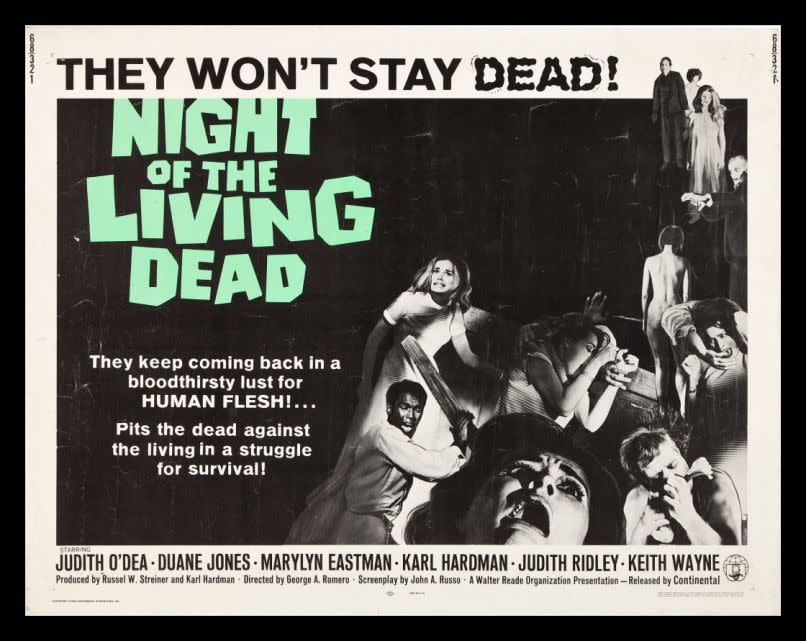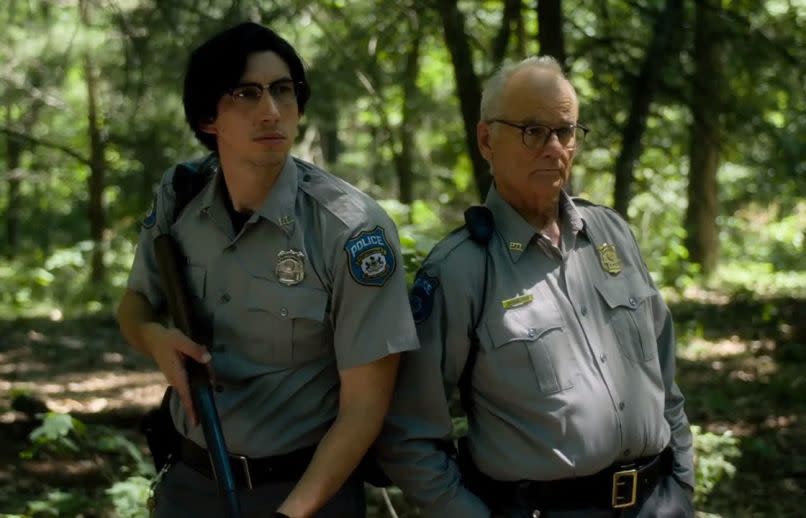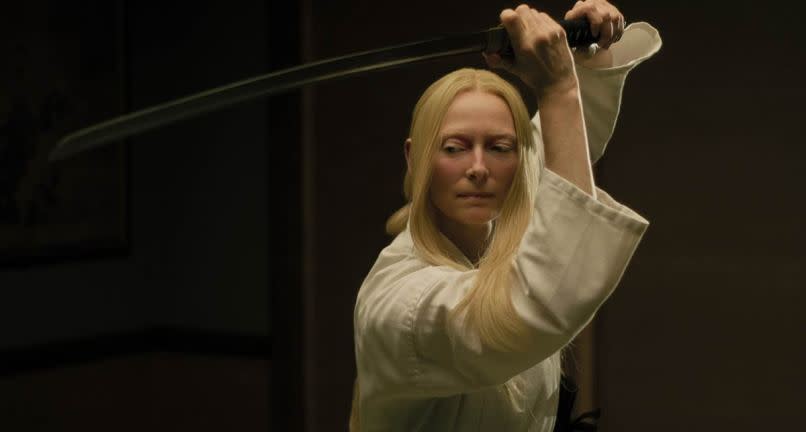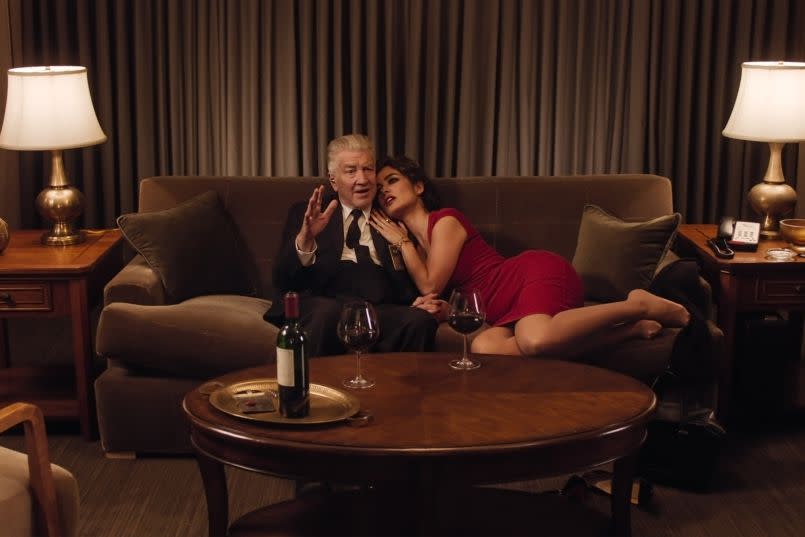“No Input, No Output”: Jim Jarmusch on Strummer’s Law, Favorite Horror Directors, and Twin Peaks
After two smaller features in 1980’s Permanent Vacation and 1984’s Stranger Than Paradise, Jim Jarmusch broke through to become one of the most important voices of the independent film scene with 1986’s Down By Law.
From his first features, Jarmusch’s distinct style was present: laid-back, deadpan, comedic, and at times poetic. No matter the genre—be it his 1995 post-modern western, Dead Man, or his 2016 Stooges documentary, Gimmie Danger —Jarmusch’s touch can be felt.
That much remains true on his latest film,The Dead Don’t Die, a slacker zombie comedy with yet another all-star cast that includes Bill Murray, Adam Driver, and Tilda Swinton amongst many others.
In anticipation, Consequence of Sound contributor Mike Vanderbilt sat down with Jarmusch to discuss how music inspires his films, how he loves naming his characters, and on casting musicians like Joe Strummer in 1989’s Mystery Train.
You’ve often said that your films are influenced by music. How—and why—did you wrangle Sturgill Simpson to compose the film’s theme song, “The Dead Don’t Die?”
I was in Boston. We were both giving Penn Awards. I was giving one to Tom Waits and Kathleen Brennan and he was giving one to John Prine. We met each other there and we just kept talking and talking. I loved his first record, High Top Mountain, it had a modern sound. I decided to write into the script that Sturgill would write a theme song that would be woven throughout the film, and alas, he did it.
[youtube https://www.youtube.com/watch?v=xiukuoSjDj0?version=3&rel=1&fs=1&autohide=2&showsearch=0&showinfo=1&iv_load_policy=1&wmode=transparent&w=806&h=454]
I was very excited. I love the song he wrote. We talked a lot about it, too, and I told him I wanted a valid and beautiful Sturgill song. I wanted something that sounded sort of like the classic country song with George Jones, Patsy Cline, or something from the early Sixties. We talked about different rhythms and songs, throwing ideas back and forth. Sturgill would send me lyrics and pieces of music as he wrote them. He put fiddle in and pedal steel, and a beautiful piano break. But everything I got from him, I just said, “This is fantastic.”
He wrote a beautiful song.
It’s probably the best country theme song I’ve heard to a zombie movie.
Yeah. Maybe the only one.
It’ll make many Halloween playlists, I’m sure.
Oh, I hope so, I love that song. I’ve heard it like a thousand time in the editing of the film and the mixing and I still love hearing it each time.
[youtube https://www.youtube.com/watch?v=PL6rhIz597E?version=3&rel=1&fs=1&autohide=2&showsearch=0&showinfo=1&iv_load_policy=1&wmode=transparent&w=806&h=454]
You scored this film alongside Carter Logan as SQÜRL.
We’ve scored as two things now. We first worked together as Bad Rabbit on The Limits Of Control. We scored Only Lovers Left Alive and Paterson, which was much more ambient, electronic. We recently scored a film about Robbie Mueller, the great Dutch cinematographer.
But this one was really what we love. We like heavy droning guitars mixed with electronics. This is what we play live. We did the score on weekends during the editing period. We had a lot of fun kind of droning away.
The film is obviously a comedy, but the score belongs to the horror.
We were steeped in the ’70s Euro scores from Goblin and Tangerine Dream, but we weren’t really imitating that. We like heavy stuff like Boris and SunnO))). It’s just in our D.N.A. that when we play together, we have a natural inclination to heavy sounds. Thurston Moore called it Molten Meditation Core.
[youtube https://www.youtube.com/watch?v=fz6t2FqHgZc?version=3&rel=1&fs=1&autohide=2&showsearch=0&showinfo=1&iv_load_policy=1&wmode=transparent&w=806&h=454]
What kind of guitars were you using on this score?
I’m mostly a Fender guy. I use a lot of effects. I have a hot-rodded Strat that I use a lot, and then I have a beautiful Telecaster built for me by Rick Kelly of Carmine Street Guitars.
There’s a beautiful film (see: Carmine Street Guitars) about Rick, who builds guitars out of really old wood and he makes them for Bob Dylan, Patti Smith. I’m in it, but that’s not why I’m plugging it. They’re just incredible.
I like a bigger pickup so I usually have a P90 or a humbucker in the bridge. So I like those guitars because they start cleaner, so going through my effects board that kind of hold up without getting muddy.
We also used quite a bit of theremin on the score.
You don’t get more creepy or horror sci-fi than that.
No, that’s the classic.
Did you play the theremin on the score?
If you wanna call it that. I’m still trying to figure out, but it’s a lovely thing to play with. It’s not easy.

You grew up on Ghoulardi in Ohio. Do you remember seeing Night Of The Living Dead for the first time?
I don’t think I saw it until the mid-70s, probably in New York at a midnight screening. I don’t think Ghoulardi ever screened it
The “zombie” as we know it today arguably was started by George A. Romero, and he also had a hand in kickstarting the independent film movement. At times The Dead Don’t Die seems to be a tribute to those films and that independent spirit.
He’s the first post-modern undead master because, for him, for the first time, the zombies are not controllable.
It’s this very strong metaphor that he uses; the zombies are us. They are remnants of a broken system, they’re not monsters from outside that system, they come from within it. They are the monsters, so to speak, but they are also the victims because they didn’t choose to be reanimated. It’s some stupid thing humans did in each case.
Romero took on that political thread 50 years ago. In our film, it’s nothing new. In fact, we’re just disappointed that nothing has changed. So there wasn’t an attempt to update that but to reiterate it.
[youtube https://www.youtube.com/watch?v=bqhcRsKcaSA?version=3&rel=1&fs=1&autohide=2&showsearch=0&showinfo=1&iv_load_policy=1&wmode=transparent&w=806&h=454]
In the film, it never felt like you were really trying to make this grand political statement about just one thing.
The film’s a comedy and a character film. It has that woven through it. I think it’s a comedy that ends with a kind of sadness.
Yes it does, but it’s very funny. The moment where Adam Driver pulls up in the drop-top smart car sent one of my colleagues down in New Orleans into a laughing fit that went on for like five, six minutes. Where did you find that car?
I said I wanted a smart car and a convertible. They brought me a red one with a black stripe. They had another one that was blue with a silver stripe and, in my particular fashion, I said I’d take the red one with a silver stripe. His head almost goes above the windshield and I thought it would be the ideal thing for his character, who is a very by-the-book, very economical guy.
You’ve dipped your toes into genre cinema before: samurai films with 1999’s Ghost Dog: The Way Of The Samurai, the western with 1995’s Dead Man, and vampires with 2013’s Only Lovers Left Alive. Yet you always bring an interesting spin to the material. What drew you to make a zombie film at this point in your career?
The obviousness of the metaphor and the times we live in drew me to it. I started the film with a different structure, more like our film Coffee & Cigarettes, where we’d have groups of actors I love holed up in different parts of the town, and between the zombie attacks, there would be long lulls in which I could have all kinds of ridiculously stupid dialogue.

200 Motels
I love that concept, too.
We retained a lot of it, including some of the stupid dialogue. I focused in on this Centreville idea and just wrote from that. The name Centreville comes from Frank Zappa’s film, 200 Motels. In fact, even the logo of that town, or at least according to Frank Zappa’s voice, “A real nice place to raise your kids up.”
There’s a laid back nature to your scripts. How much improv do you allow?
It depends completely on the actors. Some actors do not like to improvise, or it’s not there strength. Most of the cast in Dead Don’t Die stayed very close to the script. I always give them some leeway and I like it if they choose to improvise. Chloë Sevigny does not improvise, and other actors like Caleb Landry Jones, he loves to improvise. My collaboration with each actor is quite different in that way.
The final film is pretty close to the script with some nice surprises that came while we were shooting. When they decapitate Carol Kane’s character at the police station, her head rolls to their feet and she says once more, “Chardonnay.” Bill [Murray] fires a shot into her head with his police revolver and another one as a reaction. That was the only take where he did that.

Was it a challenge working with the special effects on this film? Most people know you for quieter and more introspective films such as Broken Flowers, Coffee & Cigarettes, and Mystery Train. Would you work with special effects in this vein again?
It was challenging because our schedule was very tight, and trying to imagine things that will be digitally inserted later is complicated. It was complicated, frustrating, and also really exciting and interesting at the same time. I don’t have anything up my sleeve that would have that many effects, but I’m not a big planner.
You bring your friends along with you on your movies, sending them handwritten letters and making personal phone calls when you have a part that you’ve written with them in mind. Do you ever have to hassle with financiers or casting directors on who you’re hiring or do you have complete autonomy on casting?
I have complete autonomy. I wouldn’t do it otherwise. This film I specifically wrote for Bill, Adam, Chloe, Tilda, Steve Buscemi. I always work with Ellen Lewis to decide on characters I didn’t write for. I couldn’t do it any other way.

Tilda Swinton in The Dead Don’t Die (Focus)
You and Tilda Swinton have developed a solid working relationship. Her character in The Dead Don’t Die is Scottish. Was that in the script or was that something that she brought along?
I called her when I was starting to write it and asked her, “if you’re character is an immigrant in a small town in the U.S. that’s going to have a zombie apocalypse, what profession would you like to be?” She said, without hesitation, “Oh, a mortician, of course.” I didn’t tell her she’d be Scottish or mention the swordsmanship, at first.
I was amusing myself while writing with the meta bits and the fourth-wall breaking in the film. I was trying to make something fun for myself, and then I would see how the actors felt about it and Bill and Adam really liked it, so we kept that.
I was also amusing myself with the character’s names: Tilda Swinton is Zelda Winston. Adam Driver was Paterson in Paterson, so in this, he’s Peterson. In Broken Flowers, Bill Murray was Don Johnson, which he loved, so I named him Cliff Robertson. Rosie Perez is Posie Juarez.
I do stuff like that just to amuse myself.
[youtube https://www.youtube.com/watch?v=N3EB3sEMp3Q?version=3&rel=1&fs=1&autohide=2&showsearch=0&showinfo=1&iv_load_policy=1&wmode=transparent&w=806&h=454]
You cast musicians frequently in your films and one of my favorite bits of casting is Joe Strummer in 1989’s Mystery Train. What drew you to Joe Strummer as “Elvis”?
Joe Strummer is a friend of mine, someone I deeply admire. He’s quite an interesting actor, he’s very focused. He and I were sort of like brothers in a way.
Joe Strummer, in the most minimal way, taught me one of the most valuable things I’ve ever learned about human expression. That is what all of Strummer’s friends know as “Strummer’s Law,” these four words: no input, no output. You see that in The Clash, you see that in their openness to rockabilly, to reggaee, to soul music, to hip-hop. You know, see that openness.
In that way, The Clash are the antithesis of the Sex Pistols, who were super great in their style of reduction down to the essence. The Clash were open … like “Throw open the doors, see what the wind blows in on us.”
Strummer was a very important person in my life. He’s someone who I miss a lot. I try to ask him advice sometimes, even now, and see what channels back to me. A remarkable person. I was so honored to know him.
[youtube https://www.youtube.com/watch?v=318KVRQsbb4?version=3&rel=1&fs=1&autohide=2&showsearch=0&showinfo=1&iv_load_policy=1&wmode=transparent&w=806&h=454]
Independent cinema has changed since you were starting out in the ’70s and ’80s. What are your thoughts on the impact of streaming services on independent cinema. Does streaming give people more options or is there just too much content out there?
Well, you know, things change, man. I can’t analyze that.
For me, personally, as a film geek, I love the fact that because of streaming or digital access, I can see an obscure Romanian film when I choose, you know. Then again, I love very much films being screened in a theater; film material with light passing through it. It’s something magical.
So, I have a real fondness for that magic. But my last three films have been digitally photographed. I’ve been editing digitally since Dead Man in 1995. There’s so much content, you’re right, but I don’t even like that word. But you know, there, there are so many more people, too. Is it good? Is it bad? I don’t know.

As an elder statesman of independent cinema, is there anybody out there who’s exciting you now as a filmmaker? Especially in the horror genre?
I’m old school. I love Sam Raimi, Wes Craven, and John Carpenter, I liked Get Out very much. I like the old school European films from Mario Bava and Dario Argento.
I’ve been very excited that this last year by films that were kind of disseminating in a mainstream way, which were excellent films. High Life by Claire Denis was a very unusual film. I liked Roma, The Favourite, Shoplifters, BlacKkKlansman, Death Of Stalin, and At Eternity’s Gate.
But I think the masterpiece that took the last few years in American cinema is really Twin Peaks: The Return. Eighteen hours of incomprehensible T.V. It wasn’t easy for him, and, by the way, no one will finance David Lynch’s feature films — so, what the fuck, I don’t get it. That is a real work of incredible beauty because it is so incomprehensible. I just found it to be a masterwork.
[youtube https://www.youtube.com/watch?v=bs5ZOcU6Bnw?version=3&rel=1&fs=1&autohide=2&showsearch=0&showinfo=1&iv_load_policy=1&wmode=transparent&w=806&h=454]
“No Input, No Output”: Jim Jarmusch on Strummer’s Law, Favorite Horror Directors, and Twin Peaks
Michael Roffman

